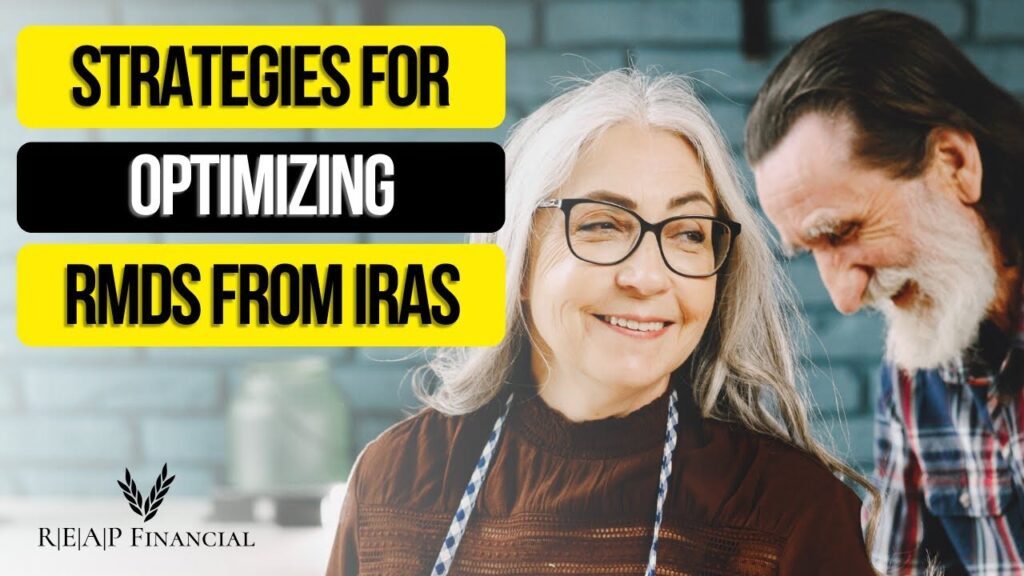For most Americans, the day you retire is the first day you have more control over your taxes than any other moment in your past. However, to take advantage of this, you have to know the strategies on how to position your wealth correctly. At REAP Financial, we want you to be set up correctly, so the IRS doesn’t dictate your IRA strategy!
Waiting for RMDs Isn’t Always the Best Strategy
Most people with significant assets in their IRAs and 401Ks allow Congress and the IRS determine their spending and distribution strategies. This is a big mistake, which can cost the retirees (and their families) big over time. According to a study done by JP Morgan Asset Management, most Americans don’t take money out of their qualified retirement accounts until their Required Minimum Distributions hit.
We’ve discussed it many times, but RMDs can be a real tax trap for middle class households, since the longer distributions are delayed the higher lifetime income taxes will be on you and your heirs. In many cases, you may need to forget about leaving your 401Ks and IRAs untouched until your RMDs kick in. Remember, that Congress sets those RMD rules for their benefit, not necessarily your benefit. It is not always a good idea to defer taxes for as long as possible. In retirement, you need to prepare to switch from a savings mindset to a distribution and spending mindset.
In the same JP Morgan Asset Management study, they found that people who took distributions earlier tended to have more wealth than the median. While there could be many reasons for that, we believe it is because those families have trusted advisors who have helped them follow a sound strategy. Because of the ways RMDs are compounded and owing to the rules your heirs will face, it can be very expensive to leave money in traditional qualified accounts for too long. This is especially true for people who have enough assets and sufficient income to fund their retirement without pulling from an IRA or 401K. Normally, these families don’t touch 401K or IRA money, choosing instead to view it as an emergency fund or legacy money. However, the result is that you and your heirs pay significantly more income taxes and stealth taxes on your Medicare.
Repositioning Your IRAs and 401Ks: Brokerage Accounts
To reduce your lifetime taxes, you should consider repositioning your IRAs and 401K accounts. This strategy is prudent when you expect income taxes to be higher in the future, plus they give you more control over your retirement funds. One strategy or a combination of strategies might suit you best, but reducing your IRAs early should be the first step. In some cases, people benefit from taking money out of their IRAs before RMDs kick in, paying the taxes upfront, and reinvesting the after-tax amount in taxable accounts, such as brokerage accounts. Traditional IRA distributions will always be taxed as ordinary income. Over the long term, it can be better to have money in taxable brokerage accounts, as opposed to IRAs that’ll be taxed as income later at a (likely) higher tax rate.
You may even be thinking beyond yourself to your children. When it comes to your kids, they are also likely to be better off inheriting brokerage accounts. If your children inherit a 401K or IRA, those distributions would still be taxed as ordinary income as well. However, if they inherit after-tax accounts instead, such as brokerage accounts, that is tax-favorable since the heirs increase the tax basis to their current market value when they inherit them. This means they can sell the assets with little to no capital gains tax, so all the appreciation from your lifetime escapes taxation.
Repositioning Your IRAs and 401Ks: Roth IRAs
Another strategy is to convert IRAs to Roth IRAs. This is probably the most used strategy today, since it has a big benefit. When you do a conversion, you pay tax to convert the IRA, but the conversion produces tax-free growth and gives you more control, since there are no RMDs on Roth IRAs. After the five year waiting period of conversion, you can distribute income and gains to yourself and your beneficiaries tax-free. When you leave a beneficiary a Roth IRA under today’s laws, the beneficiary must distribute the whole Roth within 10 years of inheriting it.
To be clear, you can convert any amount you want. There is no limit or number of conversions you can or can’t do. If you have any money in an IRA or 401K, you can do a conversion. Some people even do conversions on a yearly basis to avoid moving into a higher tax bracket. At REAP Financial, we recommend you work with an expert to create a strategic Roth conversion plan. It can have an enormous impact, even beyond the conversions themselves, by impacting your Medicare, Social Security taxation, and more.
Repositioning Your IRAs and 401Ks: Permanent Life Insurance
Another little-known strategy is to turn your IRA into permanent life insurance. Some people may get more benefits by repositioning their 401Ks and IRAs into life insurance. This is done by taking distributions from the IRA, paying the income taxes, and depositing the after-tax amount with the insurance company as life insurance premiums. This can have several benefits. First, the life insurance payout received by the beneficiaries is tax free and will be defined by the life insurance contract, as opposed to the market. The life insurance balance is also likely to be more than the current value of an IRA and is almost certainly worth more than the after-tax amount of an inherited IRA.
You should note this strategy varies depending on your age, health, and the type of permanent life insurance you purchase. You may even have the power to access the death benefit tax-free through policy loans while you’re alive to use for lifestyle, long term care, or more. These loans are not repaid until you pass away and are taken out of the life insurance benefit, before it passes to the heirs. There are many ways to pursue this strategy, with regular distributions or one large lump sum, depending on your situation.
Make Your Wealth Work Harder | Financial Planning in Austin Texas
This is just a few of the ways REAP Financial structures our clients’ wealth and planning for maximum effectiveness. If you’re interested in getting control of your taxes in retirement, get a copy of our free resource, Your Retirement Income Planning Checklist. By simply emailing retire@reapfinancial.com, we’ll have this valuable resource sent over for free, so you can optimize your retirement funds!
Our team at REAP Financial specializes in crafting personalized retirement strategies that align with your unique financial goals and lifestyle aspirations. Let us help you navigate the complexities of retirement planning and ensure a secure, comfortable future. Reach out to us for a consultation and take the first step towards a worry-free retirement in Austin.
Phone: (512) 249-7300
Main Office Address:
REAP Financial
9414 Anderson Mill Rd #100
Austin, TX 78729





